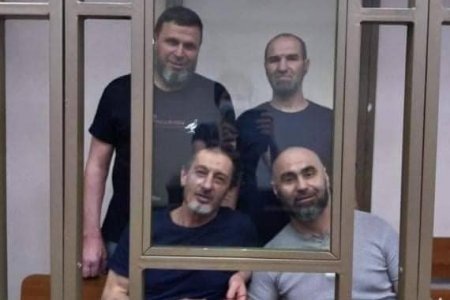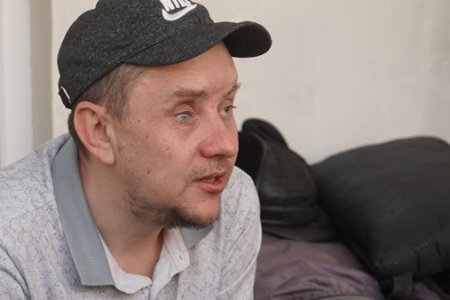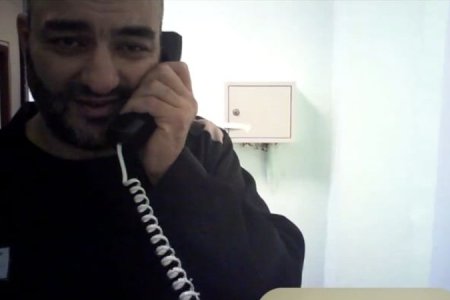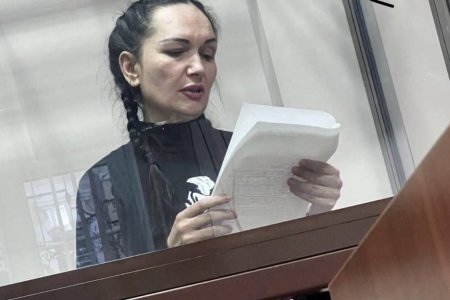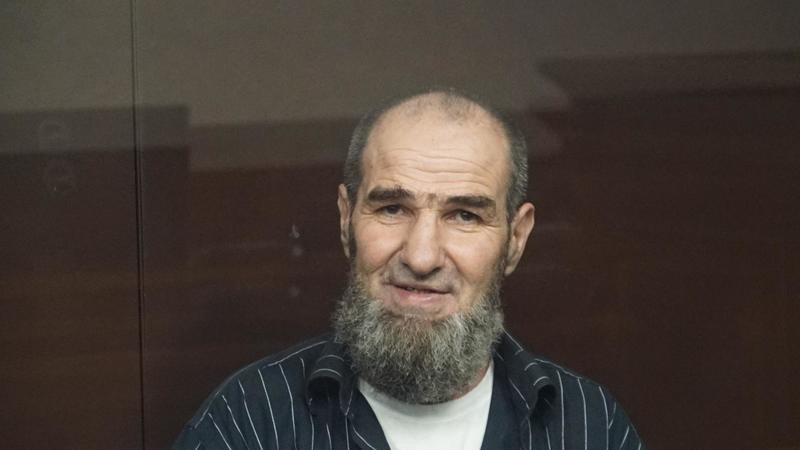
57-year-old Lenur Khalilov was taken into custody on 8 November 2025, with the gravely ill Crimean Tatar political prisoner likely to soon be sent back to die in a Russian harsh-regime prison colony in Arkhangelsk oblast. The move was expected following Khalilov’s initial rearrest on 14 October. If anything, it was the occupation officials’ compliance with the requirement that the original of the court ruling be presented before further steps were taken that was unexpected and at least gave Khalilov a brief time with his family. Russia is flagrantly flouting its own legislation, as well as international humanitarian law, by imprisoning both Lenur Khalilov, and Oleksandr Sizikov, who is totally blind as well as disabled. In Sizikov’s case, any compliance with regulations was forgotten, with the Crimean first rearrested on an absurd pretext, and then, effectively, abducted, although no original document had been received.
Umida Khudoiberdieva told Crimean Solidarity that four men in plain clothes had arrived to take her husband away on Saturday morning. They did not leave any document providing grounds for this, merely showing Khalilov the supposed court ruling. Umida was in tears as she asked why they are taking her husband, who is so ill, from his home.
Khalilov is suffering from cancer, with his condition serious enough for him to have been placed in the prison hospital almost immediately after being transferred to a maximum-security prison colony in Arkhangelsk oblast in August 2025. It seems likely that the need for medical intervention was ignored in the notorious Vladimir prison where he had been held earlier.
It was in the prison hospital that a full medical examination was carried out. This identified a number of serious conditions (including chronic hepatitis C; high blood pressure; cysts in the liver and one kidney and kidney stones). At least in the case of Crimean Tatar and other Ukrainian political prisoners, all of the above are standardly ignored. Cancer, however, is on the list of illnesses which should generate a prisoner’s release, and an oncologist had examined Khalilov and found liver cancer which had already spread to the lymph nodes. e was the diagnosis, provided by an oncologist, of liver cancer which had already spread to lymph nodes. Intervention and treatment are, therefore, urgently required, and were prescribed, n order to prevent the cancer from spreading to vital organs.
Given this diagnosis, Khalilov and his lawyer applied to the court for his release on the grounds of illness. This should have been straightforward even for Russia, and the initial ruling passed by judge N.Y. Belaya from the Isakogorsk district court in Arkhangelsk on 20 August 2025, was in full compliance with the law, as presumably ascertained by the prosecutor responsible for overseeing the prison colony who was present. The ruling was, after all, based on a medical diagnosis which unambiguously included a condition on the list of illnesses precluding imprisonment, passed by Government resolution no. 54 from 6 February 2004. On the basis of his “grave illness” and Russian regulations, the judge rightly concluded that Khalilov “cannot be held in a prison institution in general conditions and needs treatment in a specialized institution”.
This was one of two totally correct rulings, the other being that which ordered the release of Oleksandr Sizikov. Russia has already caused the death of Dzhemil Gafarov; Kostiantyn Shyrinh and other political prisoners, so nothing at all had seemed guaranteed, with pessimism proving warranted.
Although Lenur Khalilov was released from custody a few days later and returned to a huge welcome back home in Crimea, an appeal was lodged against the Isakogorsk district court ruling by prosecutor N.S. Ryazanov, with a ‘judge’ from the Arkhangelsk regional court obliging on 14 October and ordering Khalilov’s rearrest. Details can be found here of the verbiage used in Ryazanov’s appeal, however two arguments stand out for their cynicism. He claimed that “the necessary medical care was provided in full measure” and that Khalilov, whose release has been demanded by the UN, OSCE and numerous other bodies, is a terrorist’ and that releasing him would not be just in relation to the public. ‘Medical care’ in most Russian penal institutions is largely confined to painkillers, with ‘doctors’ often avoiding providing truthful diagnoses in the case of political prisoners. The second ‘argument’ is both cynical and ominous. Russia is using politically motivated supreme court rulings to justify bringing flawed and entirely unwarranted ‘terrorism’ charges against Crimean Tatars and other Ukrainian political prisoners, including prisoners of war and hostages, abducted from other territory which has fallen under Russian occupation. It then uses such flawed convictions as excuse for claiming that the political prisoners are too ‘dangerous’ to release.
This will almost certainly doom Lenur Khalilov to die a very painful death, far from his family and home, in the appalling conditions of Russian captivity. His rearrest and that of Oleksandr Sizikov are aloo an ominous indication that Russia will openly flout its own legislation to avoid releasing any Ukrainian political prisoners.
12-18-year sentences for religious independence and human rights activism
Lenur Khalilov (b. 8 December 1967) is one of four recognized Crimean Tatar political prisoners arrested on 10 June 2019. after armed ‘searches’ which made no pretence of looking for anything but ‘prohibited religious literature’. Ruslan Mesutov (b. 1965); Ruslan Nagayev, (b. 1964); and Eldar Kantimirov (b. 1980) were sentenced to 18, 13 and 12 years, respectively and remain in Russian captivity.
Although in most aspects one of Russia’s most notorious conveyor belt ‘trials’ where long sentences are guaranteed from the moment the armed searches begin, there was one specific detail. Lenur Khalilov was imam and head of the independent ‘Alushta’ religious community which the occupation regime was trying to crush, while Ruslan Mesutov was an active member of the community, as was another political prisoner and Amnesty International prisoner of conscience Muslim Aliev. The arrests on 10 June 2019 came just two weeks before the Alushta community’s legal challenge against the occupation regime’s seizure of the 19th century Yukhary-Dzhami Mosque which the community has legally occupied since 1994. Ruslan Nagayev was probably also targeted for his ‘religious dissidence’, while Eldar Kantemirov’s had actively defended political prisoners, with this, in occupied Crimea, enough to have the FSB come for you.
The men were accused only of unproven involvement in Hizb ut-Tahrir , a peaceful transnational Muslim organization which is legal in Ukraine. Russia became the first country in the world (joined in 2016 by Uzbekistan) to declare Hizb ut-Tahrir ‘terrorist in a 2003 Supreme Court ruling passed behind closed doors. with neither Hizb ut-Tahrir members, nor human rights NGOs given a chance to make submissions. No adequate explanation has ever been provided for labelling as ‘terrorist’ an organization which is not known to have committed, or even threatened, acts of terrorism or violence in Russia or anywhere else in the world.
Lenur Khalilov and Ruslan Mesutov were charged with the more serious ‘organizer’ role under Article 205.5 § 1 of Russia’s criminal code; Eldar Kantimirov and Ruslan Nagayev with ‘involvement in such an alleged ‘group’ (Article 205.5 § 2). All four men were also charged, under Article 278, with ‘planning to violently seize power’. The prosecution explained this truly surreal charge by claiming that the four men, as supposed members of Hizb ut-Tahrir, were planning a state coup via ‘“the total Islamization of the population”.
Just as there was no recognizable crime, there was no real evidence, only fake assessments’ by FSB-loyal ‘experts’ and so-called ‘secret witnesses’ who may well Such ‘evidence’, it should be stressed, is only of alleged involvement in a peaceful movement which is legal in Ukraine.
The ‘trial’ took place at the Southern District Military Court in Rostov (Russia) under presiding judge Roman Viktorovich Saprunov, together with Maxim Mikhailovich Nikitin and Rizvan Abdullayevich Zubairov, Like prosecutor Yevgeny Kolpikov, they had taken part in other such political ‘trials’, and provided the monstrous sentences demanded of them on 16 August 2021. The 18-year sentences against Khalilov and Mesutov; 13-year sentence against Nagayev and that of 12 years against Kantemirov – were all in the harshest of Russia’s appalling penal institution, with the first two years in a prison, the very worst, and then in harsh-regime or maximum-security prison colonies, which are all thousands of kilometres from the men’s homes and families in Crimea.
The sentences were all upheld on 14 August 2022 by the Vlasikha military court of appeal.
